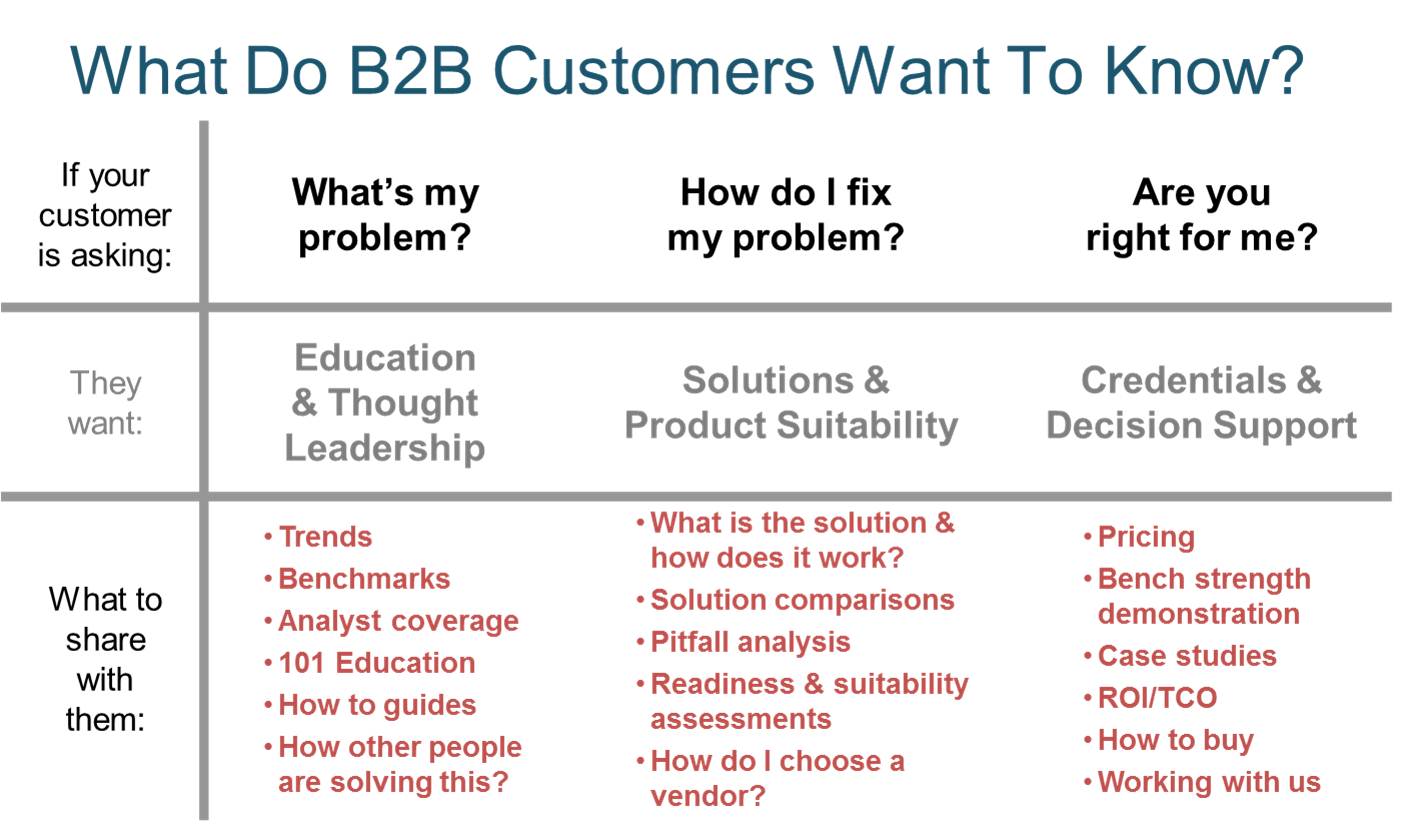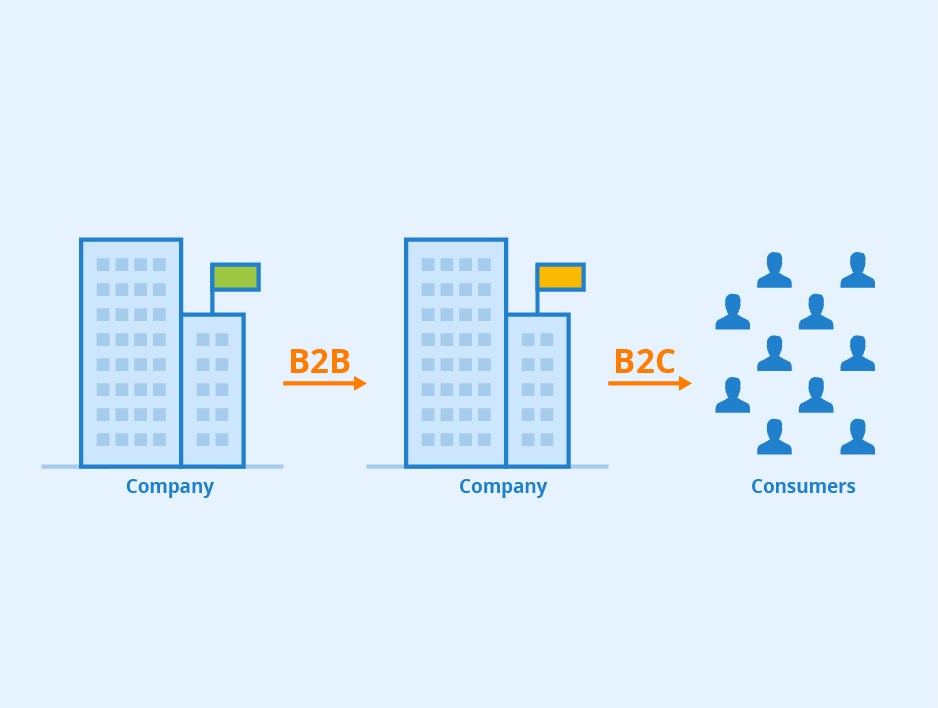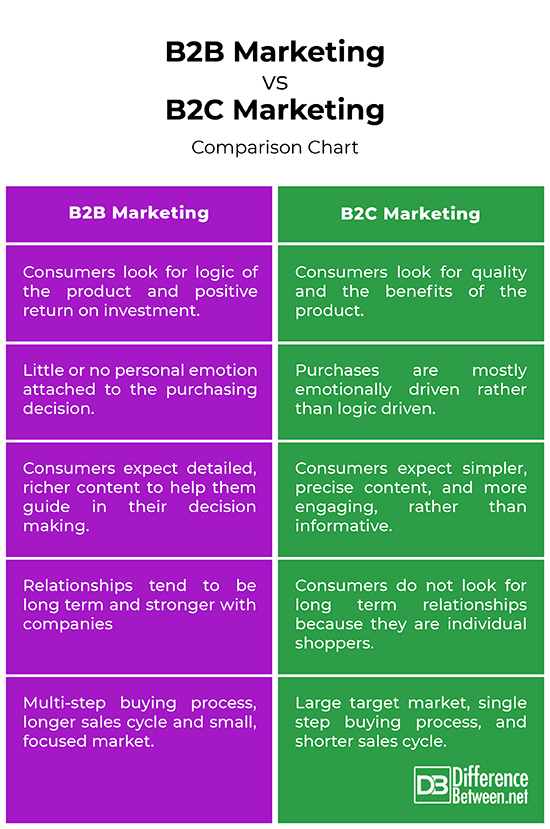Difference Between B2B and B2C Marketing
The business landscape has changed dramatically over the years, moving through multiple eras, from the production age through to the marketing age and more recently, from the globalization era to the digital era. Business today looks very different from what it used to be 10 years back. Today, even the best organizations are driven my marketing, not sales. Even though significant revenue is brought in by the sales teams and the profits that entail, the most successful businesses function with marketing at their core. Today, all business marketing strategies come under the portfolio of either B2B (business to business) or B2C (business to consumers).

What is B2B Marketing?
B2B stands for “business to business” and in the context of marketing, it is a business marketing model in which individuals or organizations market their products and services to other companies or organizations. B2B is exactly what it says it is – business to business meaning selling a product produced by one company to another company. B2B is when a business is associated commercially with another business. B2B marketing is mainly focused on the logic of the product and there is little or no emotion involved in the purchasing decision. Within B2B marketing, there are clear differences between marketing to small businesses and medium or large enterprises. This distinction is clearly between transactional marketing for small businesses and relationship marketing for medium and large enterprises.

What is B2C Marketing?
B2C or business to consumer marketing is a business model in which a company markets its products or services directly to individual people, rather than other companies. B2C is the manner of advertising concerning products which are more directed to the final consumer. In B2C marketing, companies and organizations sell their final products to the final consumer. B2C is a very different marketing mix that has its own strategies and methods and is driven by data, personalization and customer satisfaction. In the B2C marketing world, the million dollar question is “who is your target audience?” and the answer to that question is invariably same. For every online purchase your make, you are doing a B2C transaction.
Difference between B2B and B2C Marketing
Model
– The most significance difference between B2B and B2C marketing is the manner of advertising involving products and the buying decision. B2B marketing means marketing to businesses and they mainly focus on the logic of the product and there is little or no personal emotion attached when it comes to making the purchase decision. B2C marketing, on the other hand, means business to consumer in which a company markets its products or services directly to individual people, rather than other companies.
Strategy
– It all starts with strategy; in fact, strategy is the foundation for everything. B2B marketers employ different sales strategies for their business customers and they need to be aware of business buying behavior, including the needs, interests and challenges of the decision makers who make decisions on behalf of their organizations. The main strategy is to gather leads through market intelligence, ads, and content marketing, and converting those leads into prospects. B2C marketing, on the other hand, is a different game altogether; the focus is on the benefits of the product and decision is more emotional rather than rational.
Consumers
– B2B consumers look for logic of the product and positive return on investment (ROI). They are focused on efficiency and expertise, and the decisions are mostly financially motivated rather than emotionally driven. They expect more detailed richer information as well as different types of content to help guide them in their decision making process. B2C consumers do not always rely on detailed content for their decision process; in fact, they expect the content to be simpler and precise, more engaging, and stimulating rather than informative.
Target Audience
– The target audience in B2B marketing varies significantly from that of B2C. First, it varies in size and they are long term buyers. Because they make bulk purchases that would require regular maintenance and updates, relationships tend to be long term and stronger. Identifying your target audience is the key to a successful B2B marketing strategy. Marketing to consumers tend to be aimed at large group of consumers through mass media and retailers. B2C companies usually target a large audience of individual shoppers, rather than professional buyers.
Segmentation
– B2B marketing is characterized in ways that makes it very different from its consumer cousin. In B2B marketing, the decision making unit is more complex and a few consumers can make a huge difference. So, segmentation can be based on organizational factors such as industrial sector, size of a business, and the buying behavior. B2C markers have more behavioral and needs-based segments, so segmentation can occur across life stage and life cycle, such as families, teens, parents, to make marketing and budgets work better. The stakes are higher for B2B clients because more people are involved in the process.
B2B Marketing vs. B2C Marketing: Comparison Chart

Summary
So, in a nutshell, B2B marketing differs from B2C marketing in several ways, such as buying behavior, target market, number of stakeholders involved, and the buying process. For example, the buying period for a consumer to purchase a new phone could be a few days; the decision is based on a few factors such as product reviews, product quality, and so on, and after that, the consumer decides to buy it. The decision-making process in B2B marketing is a very complex process as a business looking to buy mobile phones for its salesforce would get into the details of the product, such as the technology, capability, and its business-related offerings before making the decision. The decision-making authority in B2C markets is usually one person whereas in B2B markets, there are multiple departments involved in the decision making process.
- Difference Between Caucus and Primary - June 18, 2024
- Difference Between PPO and POS - May 30, 2024
- Difference Between RFID and NFC - May 28, 2024
Search DifferenceBetween.net :
Leave a Response
References :
[0]Taylor, Heidi. B2B Marketing Strategy: Differentiate, Develop and Deliver Lasting Customer Engagement. London, United Kingdom: Kogan Page Publishers, 2017. Print
[1]Hall,Simon. Innovative B2B Marketing: New Models, Processes and Theory. London, United Kingdom: Kogan Page Publishers, 2017. Print
[2]Venkataraman, K. B2B Marketing. Chennai, India: Notion Press, 2017. Print
[3]Meyer, Sebastian. Major Differences Along the Supply Chain Between B2B and B2C Marketing with Regard to "Fast-Moving-Consumer-Goods" (FMCG). Munich, Germany: GRIN Verlag, 2007. Print
[4]Image credit: https://commons.wikimedia.org/wiki/File:B2B_buyer_decision_map.jpg
[5]Image credit: https://www.seobility.net/en/wiki/images/5/5a/B2B-Marketing.png
